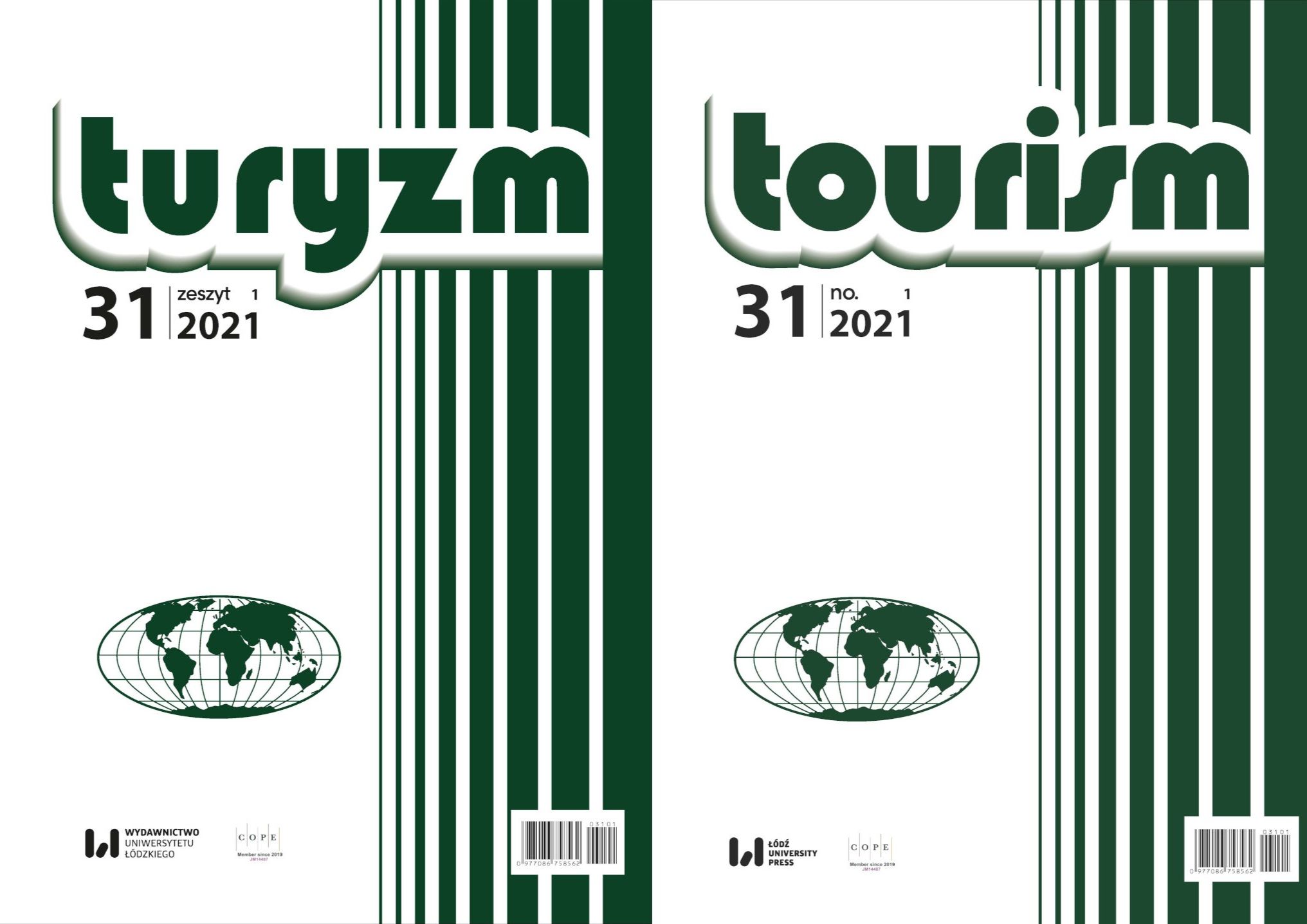Od Pauzaniasza do Baedekera i serwisu Tripadvisor: prototuryzm tekstualny oraz zagrożenia dla kanałów dystrybucji turystycznej
DOI:
https://doi.org/10.18778/0867-5856.31.1.02Keywords:
opowieść cyfrowa, digital storytelling, Pauzaniasz, prototuryzm, opowieść podróżnicza, przewodniki turystyczneAbstract
Głównym celem autorek artykułu jest interdyscyplinarne spojrzenie na turystykę i jej diachroniczne wątki tekstualne w prototurystycznych pismach Pauzaniasza – greckiego autora opowieści o podróżach. Korzystając z periegetycznych tekstów podróżniczych, zaczerpniętych z jego obszernego dzieła Wędrówki po Helladzie (Periegesis tes Hellados; II w. n.e.), będącego punktem wyjścia do rozważań, autorki zamierzają pokazać, że strategie tekstualne Pauzaniasza wciąż stanowią podstawę współczesnej serii przewodników turystycznych, zapoczątkowanej przez K. Baedekera w XIX w. Celem opracowania jest również wykazanie, że po Baedekerze tradycyjne teksty podróżnicze Pauzaniasza nadal mają wpływ na epistemologię współczesnej turystyki: interakcje między tekstami podróżniczymi, zawierającymi informacje turystyczne, a kanałami dystrybucji prowadzą do pojawienia się generycznych hybryd, a starożytni greccy autorzy podróży utorowali drogę do tworzenia cyfrowych opowiadań, sieci i globalnych platform turystycznych.
Downloads
References
Baedeker, K. (1894). The traveler’s handbook to Greece. Wyd. 2. Leipsic: Karl Baedeker, Publisher.
Google Scholar
Bassano, C., Barile, S., Piciocchi, P., Spohrer, J.C., Iandolo, F., Fisk, R. (2019). Storytelling about places: Tourism marketing in the digital age. W: J.S. Santos, Ó. Lima (red.), Digital marketing strategies for tourism, hospitality, and airline industries (s. 10–20). USA: IGI Global. https://doi.org/10.1016/j.cities.2018.12.025
Google Scholar
DOI: https://doi.org/10.1016/j.cities.2018.12.025
Bohls, E., Duncan, I. (2005). Travel writing, 1700–1830: An anthology. Oksford: Oxford Press.
Google Scholar
Bonacini, E., Tanasi, D., Trapani, P. (2018). Digital heritage dissemination and the participatory storytelling project #iziTRAVEL Sicilia: The case of the archaeological Museum of Syracuse (Italy). Acta Imeko, 7 (3), 31–39. https://doi.org/10.21014/acta_imeko.v7i3.584
Google Scholar
DOI: https://doi.org/10.21014/acta_imeko.v7i3.584
Bosangit, C., Hibbert, S., McCabe, S. (2015). If I was going to die I should at least be having fun: Travel blogs, meaning and tourist experience. Annals of Tourism Research, 55, 1–14. https://doi.org/10.1016/j.annals.2015.08.001
Google Scholar
DOI: https://doi.org/10.1016/j.annals.2015.08.001
Bosangit, C., McCabe, S., Hibbert, S. (2009). What are told in travel blogs? Exploring travel blogs for consumer narrative analysis. Amsterdam: Springer-Verlag. https://doi.org/10.1007/978-3-211-93971-0_6
Google Scholar
DOI: https://doi.org/10.1007/978-3-211-93971-0_6
Bruner, J. (2002). Making stories: Law, literature, life. Cambridge: Harvard U Press.
Google Scholar
Carù, A., Cova, B. (2008). Small versus big stories in framing consumption experiences. Qualitative Market Research: An International Journal, 11 (2), 166–176. https://doi.org/10.1108/13522750810864422
Google Scholar
DOI: https://doi.org/10.1108/13522750810864422
Cohen, E. (1979). The phenomenology of tourist experiences. Sociology, 13, 179–201. https://doi.org/10.1177/003803857901300203
Google Scholar
DOI: https://doi.org/10.1177/003803857901300203
Couldry, N. (2008). Mediatization or mediation? Alternative understandings of the emergent space of digital storytelling. New Media & Society, 10 (3), 373–391. https://doi.org/10.1177/1461444808089414
Google Scholar
DOI: https://doi.org/10.1177/1461444808089414
Cutler, S., Carmichael, B. (2010). The dimensions of tourist experience. W: M. Morgan, P. Lugosi, J.R. Brent Richie (red.), The tourism and leisure experience. Consumer and management perspective (s. 3–26). Bristol: Channel View Publications. https://doi.org/10.21832/9781845411503-004
Google Scholar
DOI: https://doi.org/10.21832/9781845411503-004
Delgadillo, Y., Escalas, J.E. (2004). Narrative word-of-mouth communication: Exploring memory and attitude effects of consumer storytelling. Advances in Consumer Research, 31 (1), 186–193.
Google Scholar
Desforges, L. (2000). Travelling the world: Identity and travel biography. Annals of Tourism Research, 27 (4), 926–945. https://doi.org/10.1016/S0160-7383(99)00125-5
Google Scholar
DOI: https://doi.org/10.1016/S0160-7383(99)00125-5
Egger, R., Buhalis, D. (2008). Introduction. W: R. Egger, D. Bu-halis (red.), eTourism case studies: Management & marketing issues in eTourism (s. 1–3). Węgry: Butterworth-Heinemann.
Google Scholar
El-Harami, J. (2015). Entertainment and recreation in the classical world – tourism products. Journal of Management and Sustainability, 5 (1), 168–178. https://doi.org/10.5539/jms.v5n1p168
Google Scholar
DOI: https://doi.org/10.5539/jms.v5n1p168
Escalas, J. (2004). Narrative processing: Building consumer connections to brands. Journal of Consumer Psychology, 14 (1), 168–180. https://doi.org/10.1207/s15327663jcp1401&2_19
Google Scholar
DOI: https://doi.org/10.1207/s15327663jcp1401&2_19
Escalas, J.E., Stern, B.B. (2003). Sympathy and empathy: Emotional responses to advertising dramas. Journal of Consumer Research, 29 (4), 566–578. https://doi.org/10.1086/346251
Google Scholar
DOI: https://doi.org/10.1086/346251
Faustino, M., Ferraro, G. (2020). The late foucault: Ethical and political questions. Londyn: Bloomsbury.
Google Scholar
Frazer, J.G. (1890). The golden bough: A study in comparative religion. Londyn: Macmillan.
Google Scholar
Freedberg, D., Gallese, V. (2007). Motion, emotion and empathy in esthetic experience. Trends in Cognitive Sciences, 11 (5), 197–203. https://doi.org/10.1016/j.tics.2007.02.003
Google Scholar
DOI: https://doi.org/10.1016/j.tics.2007.02.003
Govers, R., Go, F.M., Kumar, K. (2007). Virtual destination image a new measurement approach. Annals of Tourism Research, 34 (4), 977–997. https://doi.org/10.1016/j.annals.2007.06.001
Google Scholar
DOI: https://doi.org/10.1016/j.annals.2007.06.001
Green, M.C., Brock, T.C., Kaufman, G.F. (2004). Understanding media enjoyment: The role of transportation into narrative worlds. Communication Theory, 14 (4), 311–327. https://doi.org/10.1111/j.1468-2885.2004.tb00317.x
Google Scholar
DOI: https://doi.org/10.1111/j.1468-2885.2004.tb00317.x
Gretzel, U., Fesenmaier, D.R., Formica, S., O’Leary, J.T. (2006). Searching for the future: Challenges faced by destination marketing organizations. Journal of Travel Research, 45 (2), 116–126. https://doi.org/10.1177/0047287506291598
Google Scholar
DOI: https://doi.org/10.1177/0047287506291598
Gretzel, U., Fesenmaier, D.R., O’Leary, J.T. (2006). The transformation of consumer behavior. W: D. Buhalis, C. Costa (red.), Tourism business frontiers: Consumers, products and industry (s. 9–18). Oksford: Elsevier. https://doi.org/10.1016/B978-0-7506-6377-9.50009-2
Google Scholar
DOI: https://doi.org/10.1016/B978-0-7506-6377-9.50009-2
Gretzel, U., Jamal, T. (2009). Conceptualizing the creative tourist class: Technology, mobility, and tourism experiences. Tourism Analysis, 14 (4), 471–481. https://doi.org/10.3727/108354209X12596287114219
Google Scholar
DOI: https://doi.org/10.3727/108354209X12596287114219
H.D. (Hilda Doolittle) (1919). Notes on Euripides, Pausanius and Greek lyric poets. New Haven: Beinecke Rare Book and Manuscript Lib.
Google Scholar
Harloe, K. (2010). Pausanias as historian in Winckelmann’s history. Classical Receptions Journal, 2 (2), 174–196. https://doi.org/10.1093/crj/clq009
Google Scholar
DOI: https://doi.org/10.1093/crj/clq009
Hassan, A. (2016). Electronic word-of-mouth: An industry tailored application for tourism promotion. W: S. Rathore, A. Panwar (red.), Capturing, analyzing, and managing word-of-mouth in the digital marketplace (s. 61–75). UK: IGI Global. https://doi.org/10.4018/978-1-4666-9449-1.ch004
Google Scholar
DOI: https://doi.org/10.4018/978-1-4666-9449-1.ch004
Hsiao, K.L., Lu, H.P., Lan, W.C. (2013). The influence of the components of story-telling blogs on readers’ travel intentions. Internet Research, 23 (2), 160–182. https://doi.org/10.1108/10662241311313303
Google Scholar
DOI: https://doi.org/10.1108/10662241311313303
Hutton, W. (2005). Describing Greece: Language and literature in the periegesis of Pausanias. Cambridge: CUP.
Google Scholar
Jeuring, J.H.G., Peters, K.B.M. (2013). The influence of the weather on tourist experiences: Analyzing travel blog narratives. Journal of Vacation Marketing, 19 (3), 209–219. https://doi.org/10.1177/1356766712457104
Google Scholar
DOI: https://doi.org/10.1177/1356766712457104
Katsoni, V. (2016). An investigation of the tourism distribution channels in the VFR segment. Academica Turistica – Tourism and Innovation Journal, 9 (1), 19–29.
Google Scholar
Kelley, J.E. (2015). Excursions into modernism: Women writers, travel, and the body. Londyn: Routledge.
Google Scholar
Klimmt, C., Roth, C., Vermeulen, I., Vorderer, P., Roth, F.S. (2012). Forecasting the experience of future entertainment technology: Interactive storytelling and media enjoyment. Games and Culture, 7 (3), 187–208. https://doi.org/10.1177/1555412012451123
Google Scholar
DOI: https://doi.org/10.1177/1555412012451123
Kozinets, R., de Valck, K., Wojnicki, A., Wilner, S. (2010) ‘Networked narratives: Understanding word-of-mouth marketing in online communities’. Journal of Marketing, 74, 71–89. https://doi.org/10.1509/jm.74.2.71
Google Scholar
DOI: https://doi.org/10.1509/jmkg.74.2.71
Lavie, T., Tractinsky, N. (2004). Assessing dimensions of perceived visual aesthetics of web sites. International Journal of Human Computer Studies, 60 (3), 269–298. https://doi.org/10.1016/j.ijhcs.2003.09.002
Google Scholar
DOI: https://doi.org/10.1016/j.ijhcs.2003.09.002
Lowe, L. (1991). Critical terrains: French and British orientalisms. Ithaca: Cornell U Press.
Google Scholar
MacCormack, S. (2010). Pausanias and his commentator Sir James George Frazer. Classical Receptions Journal, 2 (2), 287–313. https://doi.org/10.1093/crj/clq010
Google Scholar
DOI: https://doi.org/10.1093/crj/clq010
Mattila, A.S., Enz, C.A. (2002). The role of emotions in service encounters. Journal of Service Research, 4 (4), 268–277. https://doi.org/10.1177/1094670502004004004
Google Scholar
DOI: https://doi.org/10.1177/1094670502004004004
McAdams, D. (1996) Personality, modernity and the storied self: A contemporary framework for studying persons. Psychological Inquiry, 7 (4), 295–321. https://doi.org/10.1207/s15327965pli0704_1
Google Scholar
DOI: https://doi.org/10.1207/s15327965pli0704_1
McCabe, S., Foster, C. (2006). The role and function of narrative in tourist interaction. Journal of Tourism and Cultural Change, 4 (3), 194–215. https://doi.org/10.2167/jtcc071.0
Google Scholar
DOI: https://doi.org/10.2167/jtcc071.0
McGregor, I., Holmes, J. (1999). How storytelling shapes memory and impressions of relationship events over time. Journal of Personality and Social Psychology, 76 (3), 403–419. https://doi.org/10.1037/0022-3514.76.3.403
Google Scholar
DOI: https://doi.org/10.1037/0022-3514.76.3.403
McSweeney, R. (2015). Tristes Tropiques by Claude Lévi-Strauss – melancholy anthropology. Pobrane z: https://www.theguardian.com/books/booksblog/2015/aug/17/tristes-tropiques-by-claude-levi-strauss-melancholy-anthropology (25.11.2019).
Google Scholar
Moscardo, G. (2010). The shaping of tourist experience: The importance of stories and themes. W: M. Morgan, P. Lugosi, J.R. Brent Richie (red.). The tourism and leisure experience: Consumer and management perspectives (s. 3–26). Bristol: Channel View Publications. https://doi.org/10.21832/9781845411503-006
Google Scholar
DOI: https://doi.org/10.21832/9781845411503-006
Neuhofer, B., Buhalis, D., Ladkin, A. (2014). A typology of technology-enhanced tourism experiences. International Journal of Tourism Research, 16, 340–350. https://doi.org/10.1002/jtr.1958
Google Scholar
DOI: https://doi.org/10.1002/jtr.1958
Noy, C. (2004). The trip really changed me: Backpackers‘ narratives of self-change. Annals of Tourism Research, 31 (1), 78–102. https://doi.org/10.1016/j.annals.2003.08.004
Google Scholar
DOI: https://doi.org/10.1016/j.annals.2003.08.004
Pace, S. (2008). YouTube: An opportunity for consumer narrative analysis. Qualitative Market Research: An International Journal, 11 (2), 213–226. https://doi.org/10.1108/13522750810864459
Google Scholar
DOI: https://doi.org/10.1108/13522750810864459
Pausanias (1992). Description of Greece. Books I and II. Tłum i wyd. W.H.S. Jones. Cambridge: Harvard U Press.
Google Scholar
Pretzler, M. (2011). Pausanias. Travel writing in Ancient Greece. Londyn: Bristol Classical Press.
Google Scholar
Pudliner, B.A. (2007). Alternative literature and tourist experience: Travel and tourist weblogs. Journal of Tourism and Cultural Change, 5 (1), 46–59. https://doi.org/10.2167/jtcc051.0
Google Scholar
DOI: https://doi.org/10.2167/jtcc051.0
Redfield, R. (1985). Herodotus the tourist. Classical Philology, 80 (2), 97–118. https://doi.org/10.1086/366908
Google Scholar
DOI: https://doi.org/10.1086/366908
Roberson, S. (2007) Geographies of the self in nineteenth century women’s travel writing. W: M. Bruckner, H. Hsu (red.), American literary geographies: Spatial practice and cultural production (s. 281–295). Delaware: University of Delaware Press.
Google Scholar
Robin, R. (2008). Digital storytelling: A powerful technology tool for the 21st century. Theory Into Practice, 47 (3), 220–228. https://doi.org/10.1080/00405840802153916
Google Scholar
DOI: https://doi.org/10.1080/00405840802153916
Sabou, G.C., Nistoreanu, P., Vlad, D. (2014). The ethics of online touristic counselling: A matter of users satisfaction. Contemporary Approaches and Challenges of Tourism Sustainability, 16 (8), 98–117.
Google Scholar
Schank, R.C., Abelson, R.P. (1995). Knowledge and memory: The real story. W: S.R. Wyer Jr (red.), Knowledge and memory: The real story (s. 1–85). Hillsdale: NJ. Lawrence Erlbaum Associates.
Google Scholar
Schmallegger, D., Carson, D. (2008). Blogs in tourism: Changing approaches to information exchange. Journal of Vacation Marketing, 14 (2), 99–110. https://doi.org/10.1177/1356766707087519
Google Scholar
DOI: https://doi.org/10.1177/1356766707087519
Schulz-Forberg, H. (2005) Unravelling civilization: European travel and travel writing. Bruksela: P.I.E – Peter Lang.
Google Scholar
Stanley, H.M. (1890). In darkest Africa. Nowy Jork: Charles Scribner’s.
Google Scholar
Stewart, R.D. (2013). Most worth remembering, Pausanias, analogy, and classical archaeology. Hesperia, 82, 231–261. https://doi.org/10.2972/hesperia.82.2.0231
Google Scholar
DOI: https://doi.org/10.2972/hesperia.82.2.0231
Tussyadiah, P.I., Fesenmaier, R.D. (2016). Marketing destination through first-person stories: A narrative structure analysis. Pobrane z: http://scholarworks.umass.edu/ttra/2007/Presented_Papers/69 (28.11.2019).
Google Scholar
Volo, S. (2010). Bloggers’ reported tourist experiences: Their utility as a tourism data source and their effect on prospective tourists. Journal of Vacation Marketing, 16 (4), 297–311. https://doi.org/10.1177/1356766710380884
Google Scholar
DOI: https://doi.org/10.1177/1356766710380884
White, N., White, P. (2004). Travel as transition: Identity and place. Annals of Tourism Research, 31 (1), 200–218. https://doi.org/10.1016/j.annals.2003.10.005
Google Scholar
DOI: https://doi.org/10.1016/j.annals.2003.10.005
Woodside, A. (2010). Brand-consumer storytelling theory and research: Introduction to a psychology and marketing special issue. Psychology and Marketing, 27 (6), 531–540. https://doi.org/10.1002/mar.20342
Google Scholar
DOI: https://doi.org/10.1002/mar.20342
Woodside, A., Cruickshank, B., Dehuang, N. (2007). Stories visitors tell about Italian cities as destination icons. Tourism Management, 28 (1), 162–174. https://doi.org/10.1016/j.tourman.2005.10.026
Google Scholar
DOI: https://doi.org/10.1016/j.tourman.2005.10.026
Wu, Q. (2006). Commercialization of digital storytelling: An integrated approach for cultural tourism, the Beijing Olympics and wireless VAS. International Journal of Cultural Studies, 9 (3), 383–394. https://doi.org/10.1177/1367877906066884
Google Scholar
DOI: https://doi.org/10.1177/1367877906066884
Youngs, T. (2013). The Cambridge introduction to travel writing. Cambridge: CUP. https://doi.org/10.1017/CBO9780511843150
Google Scholar
DOI: https://doi.org/10.1017/CBO9780511843150
Downloads
Published
How to Cite
Issue
Section
License

This work is licensed under a Creative Commons Attribution-NonCommercial-NoDerivatives 4.0 International License.










